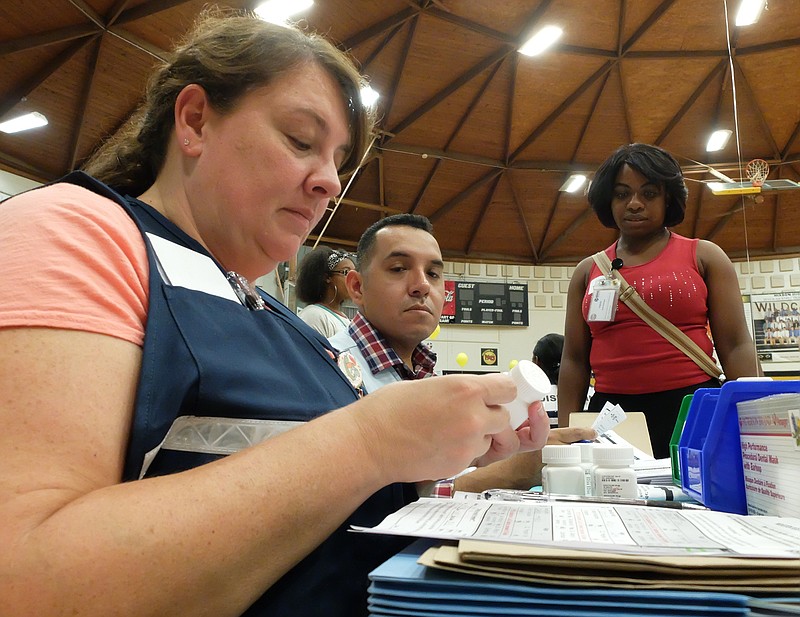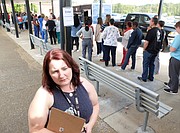Suppose a group of terrorists got access to the lot where CARTA buses are parked overnight and poured vials of deadly anthrax inside 20 vehicles. The next day, as the buses made their rounds and dozens of people became ill, health officials would face a daunting task: how do they get antibiotics to more than 350,000 Hamilton County residents in the shortest time possible?
Sabrina Novak believes she has a plan to do just that, but she wanted to test it Friday.
Novak is the emergency response coordinator for the Chattanooga-Hamilton County Health Department, and Friday she managed a drill designed, as she put it, "to see if our written plan would work."
Some 200 volunteers lined up outside Hixson High School were given fake identities, so some would appear to be elderly or pregnant, or allergic to certain medications. Health department personnel inside the high school gym had to decide how to deal with their particular issues.
Each person had to fill out a form, stating their age, whether they were pregnant, suffered from seizures, or were allergic to doxycycline, tetracycline, ciprofloxacin or were currently taking tizanidine.
Depending on their answers to those questions, they were routed to different tables inside the high school gym. If they were not pregnant and had no allergies, they could go straight to one of the 17 tables where antibiotics would be dispensed. Staffers would provide them with detailed information on how to take their medications and possible side effects.
Doctors and nurses were standing by at a medical table to deal with individual problems.
The goal, Novak said, was to process 1,000 people every hour. While the drill only lasted for a couple of hours, in a real emergency, health officials said, they would have nine "points of dispensing" at high schools across the county. If each one met the 1,000-per-hour goal, everyone in the county could get their antibiotics in less than 48 hours.
Priority would go to first responders, who would be first in line to be given a vaccine and a bottle of pills to take home to their families.
Anyone else would be allowed to pick up medication for up to 15 people, but they would need to be able to answer the questions about pregnancy and allergies of each one, Novak said. A form on the health department website would allow them to do that in advance, she said.
The health department has also been working with large local manufacturers, particularly those who have in-house nursing staffs, so they could distribute antibiotics directly to their employees, Novak said, although the identity of those already signed up is confidential.
It would take emergency officials about 12 hours to set up the dispensing locations and obtain the antibiotics, Novak said. The drugs are kept at the federal Strategic National Stockpile, at a secret location managed by the U.S. Centers for Disease Control and Prevention.
Friday's drill was only one of the possible emergency scenarios for which the health department and other emergency personnel regularly train, Novak said. Dispensing stations might be required in the event of a flu pandemic, for example. First responders and health officials also train annually for the possibility of radiation problems in the event of an accident or terror attack at either of the area's two nuclear power plants, Sequoyah or Watts Bar.
Tony Reavley, director of emergency services and homeland security for the county, said that besides preparing for a specific emergency, drills such as Friday's help to build teamwork.
"This gives us the opportunity to train and work together," he said. "It gives us face time so if something happens, we are not strangers."
For her part, Novak said she hoped the drills would reassure area residents.
"As an individual, it makes me feel better to know that emergency management is doing this planning," she said. "If I am sitting at home, I want to know they are doing this."
The health department shut down most of its operations for Friday's drill so its employees could participate. Other organizations taking part included about 40 students from Hixson High School, which was closed for fall break; the Tennessee Department of Health; the Hamilton County Sheriff's Department, Hamilton County EMS, Chattanooga Police Department, Chattanooga Fire Department, Citizens Police Academy alumni, and volunteers from the Medical Reserve Corps.
The Medical Reserve Corps is open to anyone who is 18 or older. Volunteers do not need medical training, Novak said, and anyone interested should contact the health department.
Contact staff writer Steve Johnson at 423-757-6673, sjohnson@timesfreepress.com, on Twitter @stevejohnsonTFP, and on Facebook, www.facebook.com/noogahealth.

